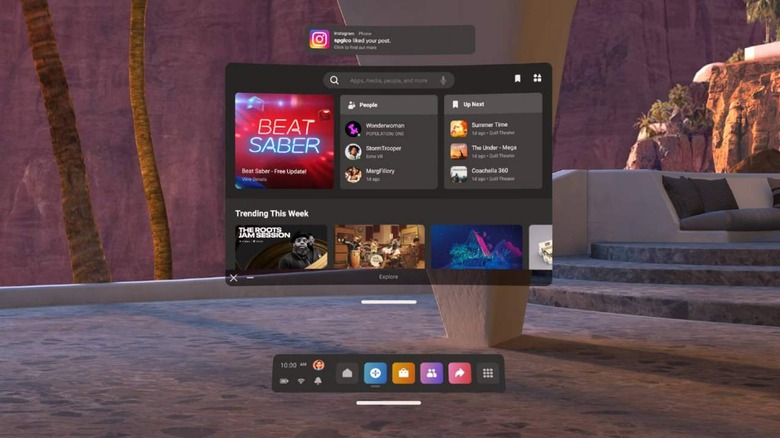Oculus Quest v34 detailed: Voice commands, Android, and Space Sense
Only a week after its latest Connect event, Oculus is now rolling out software version 34 to Quest VR headsets, giving users access to a variety of new features and improvements. Of note, Quest update 34 will make the VR headset more useful for Android users who don't like to be away from their phone, as well as more convenient voice commands and improved Guardian functionality.
Oculus Connect 2021 took place last week, giving Quest headset owners a look at Horizon Home, Quest for Business, enhanced multitasking features, the Active Pack for fitness use, support for Messenger audio calls, and the fascinating mixed-use Presence Platform for developers who want to combine virtual elements with the real world.
Though it's going to take time for some of these features and changes to roll out, Oculus has announced that it is deploying the Quest version 34 software update today. Oculus says this will be a slow rollout, meaning it may take some time before all Quest owners are prompted to update the headset firmware. What can users expect?
Space Sense joins Guardian
Oculus users will already be familiar with Guardian — it's the safety feature that allows players to draw a line over the floor, marking the play area's boundaries. Guardian is great to avoid accidentally tripping over furniture or running into a wall, but it has one big limitation: it doesn't tell you when someone else has entered the play area.
Space Sense is designed to address this issue by alerting players when someone else has stepped over the play area boundaries, such as a toddler who doesn't realize they've put themselves in danger of being trampled or an annoying friend who wants to give you a shove while walking across a virtual tight rope.
Though pranks involving touching a player while they're wearing the headset often result in fun videos for social media, they remain a hazard for the player who may, for example, panic and run outside of the play area or fall over, hurting themselves.
Space Sense will also show when something other than a person has moved within the play area's boundaries, such as a larger pet or an object like a child's firetruck toy. Oculus says Quest users will see the intruder or object in the headset with a pink glow around it.
VR users have been requesting this kind of feature for a while, and though it is finally rolling out, Oculus notes that it is still refining Space Sense. For that reason, the new functionality is an Experimental Feature and must be enabled in Settings.
Android notifications
Quest update version 34 is also bringing integration with Android, meaning players who own Android smartphones will be able to see push notifications in the VR environment once the update arrives on their headsets. This same functionality has been available for iPhone users since software update version 29 rolled out to users back in May.

With this update, Quest users can enable push notifications using the Oculus App. Once set up, users can then enable the notifications using the Settings menu within the headset environment. The new functionality supports all of the app notifications that appear on the Android phone, meaning users will see things like text messages, Instagram notifications, newly uploaded YouTube videos from creators they follow, and similar things.
A key aspect of this new support is Multi-User Accounts, which allows more than one person to share the same Quest headset without seeing the other users' phone notifications. Beyond that, users also have the option to disable notification sharing so that their VR environment remains separate from their smartphone.
More voice commands
Voice commands are arguably the easiest way to control a VR headset, eliminating the need to use the controllers for pointing and clicking through menus. The new Quest version 34 update is improving Oculus's Voice Commands functionality so that they're able to accommodate "everyday tasks," according to the company.
This includes the new ability to play and pause media in certain apps, including Oculus TV, as well as opening Settings, hiding Move stats, asking for the weather, and other simple, common things.
Presence platform
In addition to the three big new updates, Oculus has also provided an update on its Passthrough API, which is part of the Presence Platform for mixed-use apps and features. Passthrough API was released as an experimental feature for developers earlier in 2021, paving the way for mixed-reality experiences combining VR elements with the real world. One example of this functionality was demonstrated in a video: learning to play the piano by viewing the right song notes overlaid on the player's actual real-life piano.
In its latest update, Oculus said it will soon release the SDK so that developers can get their mixed-reality experiences in the App Lab and Oculus Store. This, in turn, will make it possible for Quest users to download the new experiences, enabling them to utilize their VR headsets in an entirely new way.
